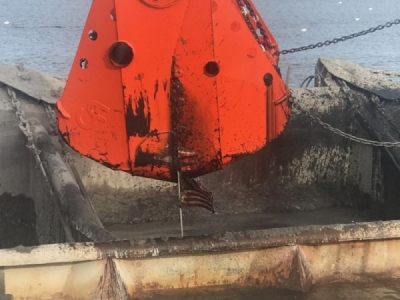
Posted on February 14, 2019
The process was repeated countless times during the dredging with the same results – except one time.
PLYMOUTH – Time and time again, the clamshell bucket splashed into the water. Each time, the massive iron jaws brought up a small mountain of sand, then dropped the load in a waiting scow.
The process was repeated countless times during the dredging of Plymouth Harbor with the same results – except one time. That’s when all work stopped and everyone grabbed their cameras.
“That big bucket had an American flag hanging from the bottom of it,” said Harbormaster Chad Hunter. “It was on a short mast and it was flying normally. It probably snapped off a boat in a storm. The teeth of the bucket had grabbed it just right. You couldn’t have set up the shot any better than that.”
It was a picture-perfect moment for the dredging operation that just wrapped up the season. Everything ran smoothly during the first round of the two-year $14 million project. It even finished ahead of schedule.
“We had hoped to get the channel done this year,” Hunter said. “The dredgers did that and started working on the mooring fields. They got about a third of that completed too. We’re in good shape for the second phase.”
Starting in October, Plymouth Harbor was awash in activity. Three huge floating cranes grabbed tons of sediment and dumped it into massive scows, which were then hauled out to sea by coastal tugboats. The split-bottom barges then emptied their loads in designated areas and returned to Plymouth for more silt.
In all, the project will remove an expected 400,000 cubic yards of sand and debris that has drifted in over the years. When completed in January 2020, the channel will be 15 deep at low tide, while the mooring areas will be 8 feet deep. The channel was around 12 feet in the middle of the harbor but only around 7 feet near the shore. The deeper depth will allow larger vessels to visit Plymouth, including a planned Tall Ships regatta during the town’s 400th anniversary.
“It’s kind of hard to judge the progress from shore,” Hunter said. “You see them doing all this work but you can’t see anything changing. It’s not like a hill of dirt on land disappearing. But when you go out on a boat and see how deep the channel is now, it’s like, wow.”
Three dredges worked the harbor over the fall and into the winter. Burnham Associates was awarded the contract by the U.S. Army Corps of Engineers, which is funding the operation. Two other firms – Cashman Dredging & Marine Contracting Co. and AGM Marine Contractors – were brought in as subcontractors so the work could be completed at a faster pace.
The three companies will return in the fall to complete the work. Dredging the mooring field means the concrete blocks all have to be removed. The town is consulting with an engineering firm about how best to return those blocks and perhaps gain more space for additional moorings.
Plymouth also intends to dredge other parts of the harbor, including southern mooring fields, that also have filled with silt. That project won’t be part of the federal dredging and will be put out to bid by the town. In all likelihood the same contractors will do that work.
“It’s cheaper for them do to it since they already have the equipment here,” Hunter said. “We won’t have to pay mobilization fees to move the dredges.”
The harbormaster is pleased that the dredging is ahead of schedule. That provides a cushion to complete the work on time. The weather cooperated for the first season but there is no guarantee that will happen again this fall.
“We have a jump start for next year,” Hunter said. “If a series of storms slam us, we could really get behind.”
Source: plymouth.wickedlocal.com





